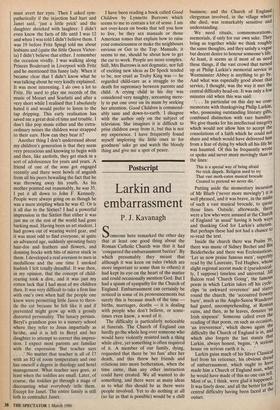Postscript
Larkin and embarrassment
P. J. Kavanagh
The difficulty is particularly noticeable at funerals. The Church of England can hardly go the whole hog over someone who would have violently resisted such a thing while alive, yet something is often required of it. A member of our family, dying, requested that there be `no fuss' after her death, and this threw her friends and relations into more botheration, when the time came, than any other instruction could have created. We all wanted to do something, and there were as many ideas as to what this should be as there were people involved. Yet to do nothing at all (so far as that is possible) would be a chill business; and the Church of England clergyman involved, in the village where she died, was remarkably sensitive and understanding.
We need rituals, commemorations, memorials, if only for our own sake. They bring us together while we think roughly the same thoughts, and they satisfy a vague but decent desire to honour someone's life. At least, it seems as if most of us need these things, if the vast crowd that turned up at Philip Larkin's memorial service in Westminster Abbey is anything to go by. And what was especially good about that service, I thought, was the way it met the central difficulty head-on. It was only a few minutes old when this was said: `. . . In particular on this day we com- memorate with thanksgiving Philip Larkin, who, possessing outstanding literary gifts, combined distinction with rare humility. We give thanks for his intellectual integrity which would not allow him to accept the consolations of a faith which he could not share and which would have delivered him from a fear of dying by which all his life he was haunted. Of this he frequently wrote or spoke and never more movingly than in the lines:
This is a special way of being afraid No trick dispels. Religion used to try That vast moth-eaten musical brocade Created to pretend we never die.'
Putting aside the momentary incursion of Mr Blurb (`never more movingly') it is well phrased, and it was brave, in the midst of such a vast musical brocade, to quote those lines. Outside, afterwards, there were a few who were amused at the Church of England 'as usual' having it both ways and thanking God for Larkin's atheism. But perhaps these had not had a chance to re-read the text.
Inside the church there was Psalm 39, there was music of Sidney Bechet and Six Beiderbecke and there was Ecclesiasticus, `Let us now praise famous men', superbly read by the Laureate; Ted Hughes, whose slight regional accent made it (paradoxical ly, I suppose) timeless and universal. Jill Balcon read 'Church Going', the famous poem in which Larkin takes off his cycle" clips 'in awkward reverence' and stares round the church, the 'accoutred frowsty barn', much as the Anglo-Saxon Wanderer had gazed, uncomprehending, at Roman ruins, and then, as he leaves, donates an Irish sixpence'. Someone called even the reading of that poem, on such an occasion, `an irreverence', which shows again the difficulty the Church of England is in, and which also forgets the last stanza that Larkin, always honest, begins, 'A serious house on serious earth it is, . . Larkin gains much of his Silver Classical feel from his reticence, his obvious dread of embarrassment, which ought to have made him a Church of England man, what he would have made of this no one can tell. Most of us, I think, were glad it happened. It was finely done, and all the better for the central difficulty having been faced at the outset.














































 Previous page
Previous page